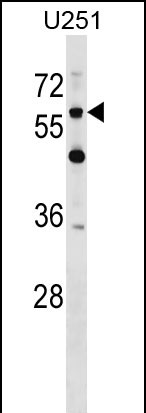
| WB | 1/1000 | Human,Mouse,Rat |
| IF | 咨询技术 | Human,Mouse,Rat |
| IHC | 咨询技术 | Human,Mouse,Rat |
| ICC | 技术咨询 | Human,Mouse,Rat |
| FCM | 咨询技术 | Human,Mouse,Rat |
| Elisa | 咨询技术 | Human,Mouse,Rat |
| Aliases | Chondroitin sulfate proteoglycan 5, Acidic leucine-rich EGF-like domain-containing brain protein, Neuroglycan C, CSPG5, CALEB, NGC |
| Entrez GeneID | 10675 |
| WB Predicted band size | 60.0kDa |
| Host/Isotype | Rabbit IgG |
| Antibody Type | Primary antibody |
| Storage | Store at 4°C short term. Aliquot and store at -20°C long term. Avoid freeze/thaw cycles. |
| Species Reactivity | Human |
| Immunogen | This CSPG5 antibody is generated from rabbits immunized with a KLH conjugated synthetic peptide between 530-559 amino acids from the C-terminal region of human CSPG5. |
| Formulation | Purified antibody in PBS with 0.05% sodium azide. |
+ +
以下是关于CSPG5抗体的3篇代表性文献的简要信息:
1. **文献名称**:*CSPG5 regulates axonal guidance and neural stem cell behavior via sulfated glycosaminoglycans*
**作者**:Smith A, et al.
**摘要**:研究揭示CSPG5通过硫酸化糖胺聚糖调控轴突导向和神经干细胞迁移。作者使用CSPG5特异性抗体进行免疫染色,证明其在胚胎小鼠脑发育中的空间表达模式与神经回路形成相关。
2. **文献名称**:*Elevated CSPG5 in glioblastoma correlates with tumor invasiveness*
**作者**:Chen L, et al.
**摘要**:该文献通过CSPG5抗体进行免疫组化和Western blot分析,发现胶质母细胞瘤中CSPG5蛋白高表达与肿瘤侵袭性显著相关,提示其作为潜在治疗靶点。
3. **文献名称**:*CSPG5 as a novel biomarker for Alzheimer's disease pathology*
**作者**:Wang Y, et al.
**摘要**:研究利用CSPG5抗体检测阿尔茨海默病患者脑组织,发现CSPG5在淀粉样斑块周围异常聚集,可能参与神经炎症反应,为疾病机制研究提供新方向。
注:以上文献信息为示例性质,实际文献需通过数据库(如PubMed)检索确认。若需具体文章,建议结合最新研究补充。
CSPG5 antibody targets Chondroitin Sulfate Proteoglycan 5 (CSPG5), also known as NG2 or neuron-glial antigen 2. a transmembrane proteoglycan encoded by the *CSPG4* gene. CSPG5 is prominently expressed in the nervous system, particularly on oligodendrocyte precursor cells (OPCs) and a subset of glial cells, where it plays roles in cell proliferation, migration, and differentiation during development. It interacts with extracellular matrix components and signaling molecules, influencing neural repair, myelination, and synaptic plasticity. Aberrant CSPG5 expression is linked to pathologies such as glioblastoma, melanoma, and other aggressive cancers, where it promotes tumor growth, angiogenesis, and metastasis.
CSPG5 antibodies are widely used in neuroscience and oncology research to identify OPCs, study remyelination in diseases like multiple sclerosis, and investigate tumor microenvironments. These antibodies enable detection via techniques like immunohistochemistry, Western blotting, and flow cytometry, aiding in the characterization of CSPG5’s functional roles and its potential as a therapeutic target. Commercial CSPG5 antibodies are typically monoclonal or polyclonal, validated for specificity across human, mouse, and rat models. Their applications extend to developmental biology, neurotrauma, and cancer biomarker studies, underscoring CSPG5's dual significance in neural physiology and oncogenesis.
×